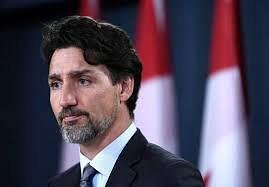Justin Trudeau plots Canada's sharpest turn left in economic policy in decades
Justin Trudeau’s selection of Chrystia Freeland to be Canada’s new finance minister cements her place as his most trusted lieutenant, hinting the 52-year-old former journalist isn’t done with her political rise. But its real significance is that it signals the most decisive lurch to the left in economic policy in at least four decades.
Freeland has firmly established herself as Trudeau’s Ms. Fix-It during their five years in power, handling President Donald Trump on trade and the energy-rich western provinces on their grievances. She’s now being tasked with nothing less than remaking the country’s socio-economic architecture.
As she put it in her inaugural news conference, COVID-19 offers “a fabulous opportunity for our country†to craft an “equitable†and “green†recovery. This echoed Trudeau’s own promise “to get through this pandemic in a way that gives everyone a real and fair chance at success, not just the wealthiest one per cent.â€
That’s a refrain increasingly heard all over the globe as the pandemic accelerates a surge in income inequality that began decades ago. For Freeland, it has long been a source of great concern. In 2012, she penned “Plutocrats,†a book that examines the growing divide between rich and poor and helped put her on Trudeau’s radar.
Making her vision a reality will mean using her consensus-building skills to parry resistance from business, provincial governments and a wing of the Liberal caucus that’s wary of huge deficits.
Parliamentary Reset
“She’s got a tough few months ahead of her but she brings a lot of good things to the table and I don’t think you can question her commitment and her fortitude,†said Scott Clark, a former senior official in Canada’s finance department.
Her first announcement as finance chief was a $37 billion package -- in the works before she took over -- to help the jobless and people who can’t work because they’re caring for family members whose lives have been disrupted by COVID-19. The government will unveil the next elements of its agenda in a Sept. 23 speech to open a new session of parliament.
Freeland showed her grit in the contentious renegotiation of the North American trade deal. The stakes were huge: Canada sends about three-quarters of its exports to the U.S. But the final deal was seen as a victory for her, with Canada making mostly minor concessions to Trump.
The trade scuffle established Freeland as Trudeau’s most reliable minister and made her a logical choice when the prime minister fell out with Bill Morneau, who resigned last Monday after tensions between the two broke into the open.
Morneau, as one of the most fiscally conservative members of Trudeau’s cabinet, fought at times against a prime minister’s office that was preoccupied with announcing COVID-19 financial aid as quickly as possible, sometimes with little economic analysis. Trudeau’s government is on track to run a record budget deficit of about C$343 billion this year -- 16 per cent of gross domestic product. It could go even higher, potentially exceeding the 18 per cent gap expected in the U.S.
It’s a major expansion of the federal government along the lines of the one overseen by Trudeau’s father, Pierre Elliott Trudeau, who increased program spending and deficits in the early 1980s to combat a recession.
Comments
There are 0 comments on this post






